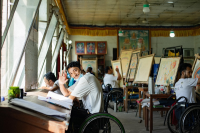Culture & Lifestyle
Navigating empty nest syndrome
The condition refers to the grief experienced by parents when their children move away from home.
Tashi Gurung
As the holidays come to a close this year, I’ve been reflecting on the families in my surroundings and their situations. I’ve observed family and friends returning from overseas, some after many years. Witnessing their reunions and the heartwarming moments spent together filled me with joy. However, as the festivities conclude, many find themselves heading back abroad to resume their regular lives. For most of these individuals, the opportunity to visit their families arises only once or twice a year, or sometimes even less frequently, due to financial constraints.
Year after year, there’s a growing trend of young people leaving Nepal for foreign shores, whether for education or employment. The phenomenon of brain drain is becoming increasingly evident, with stories of relatives pursuing university studies in the US or aunts seeking work in the Gulf as migrant labourers. This trend is something we’re seeing more and more in our community.
While much attention is given to the phenomenon of brain drain, there’s another trend that often goes unnoticed—the impact on those who are left behind. In my neighbourhood, I’ve observed a common occurrence: households where only the parents remain. It’s become a rarity to find families with adult children still living at home. This led me to contemplate a concept known as the empty nest syndrome.
The empty nest syndrome refers to the grief experienced by parents when their children move away from home. In Western societies, this is a familiar occurrence, as it’s not uncommon for children to leave home around the age of 18. However, in Nepali society, the expectation has traditionally been for children to stay with their families in multi-generational households.
With the changing dynamics brought about by the brain drain, circumstances are evolving. Going abroad for higher education or work is increasingly seen as a status symbol, particularly among urban families. Consequently, parents may encourage their children to pursue opportunities overseas, leaving them with empty households.
While parents are excited and optimistic about their child’s newfound independence away from home, they also have to contend with the challenge of living alone, resulting in strong feelings of loneliness.
Moreover, it’s quite common for parents to experience a sense of emptiness. The sudden quietness of their surroundings can be overwhelming, disrupting the daily routines they’ve maintained for a long time. The absence of a defined purpose can lead to existential concerns, triggering various emotions such as irritability, frustration and resentment.
Concerns about their child’s well-being often occupy the minds of parents. They may continually question whether they adequately prepared their child for an independent life. Lingering doubts about worst-case scenarios regarding their child’s safety can also be a constant source of worry.
A significant shift occurs in one’s own identity, akin to the feelings one might experience during divorce or retirement. Mothers, in particular, are often more affected, given that many of them are stay-at-home parents whose lives have primarily revolved around their children.
Despite the sense of loss and apprehension, it’s crucial to acknowledge the benefits of being an ‘empty-nester’. Parenting is demanding, and with newfound free time, there’s ample opportunity to focus on personal needs and desires. This phase can be viewed as an opportunity to reshape one’s identity, adapting to the role of a parent of an adult child—a distinct identity separate from their child.
As a result, parents begin to relate to their children as adults, fostering a deeper connection built on mutual respect and appreciation. Parents empathise with their child’s challenges in navigating the real world, while children gain a better understanding of the significant responsibilities their parents undertook.
As parents feel liberated from their old identities, they are able to rediscover themselves. This shift can certainly be a wonderful avenue to explore any career, and educational or vocational goals that might have gotten neglected being a parent. Reigniting old hobbies or passions can be a wonderful way to start.
It’s inevitable that people move away from their homes, leaving some behind. While there are both positive and negative changes, viewing them from a different perspective can help normalise and accept these shifts as a natural part of life. Despite the difficulty and emotional challenges, considering it as a normal life occurrence and having faith that those who have moved on are living the lives they want can bring comfort and hope.
Gurung is a counselling psychologist. He works in Happy Minds, a mental health and well-being platform.




 8.55°C Kathmandu
8.55°C Kathmandu















